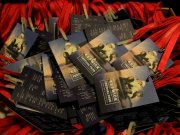Festival History
Whether you're new to the event or want to revel in remembrance of films past, former Keswick Film Club Chairman Rod Evans takes you on a journey through the past.
KFF6 February 2005
Considerable changes were to take place in 2005 with the advent of a new director and some new faces as volunteers. Alex Greenwood had been on hand to cast an eye over proceedings in 2004, and with that experience and her knowledge gained from working for Channel 4 she was able bring new ideas and a little more professionalism to the way in which the old guard had been running things. Out went the film-director-retrospective and the Buried Treasure strands – indeed, out went strands altogether, as the new plan was to present a programme of the latest good films available, along with an educational element which, it was hoped, would appeal to local schools and encourage their involvement in filmmaking and appreciation.
Alex and David Miller would be working on the programming, and we also welcomed Katherine Anderson into the fold to help with selection and publicity, and also to run some films at the Theatre by the Lake in the week leading up to the Festival; Katherine had taken up the post of Administrator at the Theatre, which was very good news for Keswick Film Festival as she was an old friend from her previous existence as Film Exhibition Officer of Northern Arts, and had helped the Festival greatly in its infancy in 2001.
As things transpired, the committee was surprised to find that the lecturers they had in mind for Education Days were fully booked up, so it was decided to concentrate all efforts to encourage schools' participation on the appearance of Jeremy Gilley with his film Peace One Day. Encapsulating his stunning idea of getting the United Nations to declare an annual cease-fire day, and describing his efforts and successes, Jeremy's film was very accessible to all ages, and his stimulating personal brio won him many new friends and supporters locally. A worthy Festival opener.
There was lots going on: ideas about expansion of the Festival (we nearly changed its name to The Lake District Film Festival), including the appointment of a consultant funded by UK Film Council via NorthWestVision to look into ways of expanding and possibly professionalising the event; working quite closely with the C.I.A. (no, Cumbria Institute of the Arts!) and getting students to produce the brochure and participate during the Festival; there was much casting around for grants and local sponsors - Square Orange, YHA, Booths came on board – 10,000 brochures were ordered and distributed, and Alan (Smith) and Rod were still beavering away behind the scenes trying to turn other people's dreams into reality.
To return briefly to the programme, there were indeed no themes selected but this year we gave a fair wind to the Far East: A Tale of Two Sisters and Goodbye Dragon Inn failed to find many fans, but House of Flying Daggers, Nobody Knows and Oldboy did well. However the two most highly-regarded films by far were Iciar Bollain's Take My Eyes and Shane Meadows' Dead Man's Shoes. Disappointingly, the attempt to attract a younger audience through such as Napoleon Dynamite and Gus van Sant's Elephant fell short of the mark, but My Summer of Love packed 'em in (audience of 172). And there was to be a surprise film slot: excited to find that the distributors would allow us a pre-release screening of Francois Ozon's 5 x 2, we built up the suspense accordingly... but the print didn't arrive! (the film was eventually shown in the Film Club's Autumn programme)
Despite the unavailability of the Theatre's Studio this year, the number of tickets sold and income for the event were more than 50% up on the previous year, so something was going right, and there was much optimism for the Festival's future.
See All KFF6 Films













